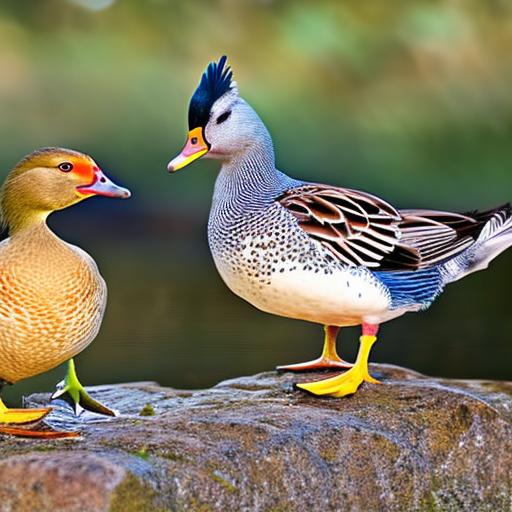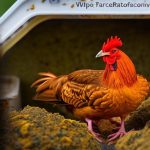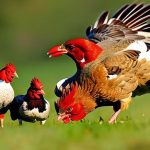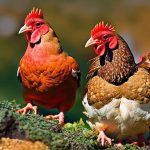Raising ducks and chickens together has become a popular trend among backyard farmers in recent years. This practice involves keeping both ducks and chickens in the same coop and allowing them to coexist peacefully. While ducks and chickens have some differences in terms of their physical characteristics and behaviors, they can actually complement each other quite well. This article will explore the benefits of keeping ducks and chickens together, as well as provide tips on how to successfully manage a mixed flock.
Key Takeaways
- Raising ducks and chickens together can be a rewarding and efficient way to keep poultry.
- Benefits of keeping ducks and chickens together include pest control, increased egg production, and social interaction.
- Understanding the differences between ducks and chickens is important for proper care and management.
- Choosing the right breeds for your flock can ensure compatibility and optimal egg production.
- Housing and coop requirements for ducks and chickens should accommodate their unique needs and behaviors.
Benefits of Keeping Ducks and Chickens Together
One of the main benefits of raising ducks and chickens together is that they can coexist peacefully. While ducks are known for their messy habits, they can actually help keep the coop clean by eating insects and pests that may bother the chickens. Ducks are also excellent foragers and can help control pests in the garden as well. Additionally, ducks and chickens can provide a variety of eggs for consumption. Duck eggs are larger than chicken eggs and have a richer flavor, while chicken eggs are more commonly consumed and preferred by many people. Having both types of eggs available can provide a diverse range of options for cooking and baking. Lastly, ducks and chickens can provide companionship for each other. They can form bonds and socialize together, which can be beneficial for their overall well-being.
Understanding the Differences Between Ducks and Chickens
Ducks and chickens have some distinct physical and behavioral differences that should be taken into consideration when raising them together. Physically, ducks have webbed feet, while chickens have clawed feet. Ducks also have bills instead of beaks, which they use to filter food from water. Behaviorally, ducks are more water-oriented than chickens and enjoy swimming and splashing around in water. Chickens, on the other hand, prefer to stay on land and scratch the ground for food. It is important to understand these differences in order to provide appropriate housing and care for both species.
When it comes to identifying different breeds of ducks and chickens, there are a few key characteristics to look for. Ducks come in various breeds, such as Pekin, Rouen, and Muscovy. Pekin ducks are the most common breed and are known for their white feathers and orange bills. Rouen ducks have a similar appearance to wild mallards, with dark feathers and green heads. Muscovy ducks are larger in size and have unique red facial skin. Chickens also come in a wide range of breeds, including Rhode Island Reds, Leghorns, and Orpingtons. Rhode Island Reds are known for their brown feathers and excellent egg-laying abilities. Leghorns are smaller in size and have white feathers, while Orpingtons are larger and have fluffy feathers.
Choosing the Right Breeds for Your Flock
| Breed | Egg Production | Meat Production | Temperament | Hardiness |
|---|---|---|---|---|
| Rhode Island Red | 250-300 eggs per year | Fair | Docile | Hardy in cold weather |
| Leghorn | 280-320 eggs per year | Poor | Flighty | Not cold hardy |
| Orpington | 180-200 eggs per year | Good | Friendly | Hardy in cold weather |
| Cornish Cross | N/A | Excellent | Docile | Not cold hardy |
When choosing breeds for your mixed flock of ducks and chickens, there are several factors to consider. First, you should consider the climate in your area and choose breeds that are well-suited to the local weather conditions. Some breeds of ducks and chickens are more cold-hardy, while others are better adapted to warmer climates. You should also consider the purpose of your flock. If you are primarily interested in egg production, you may want to choose breeds that are known for their high egg-laying abilities. If you are more interested in meat production, there are specific breeds that are bred for their meat quality.
Popular breeds for backyard flocks include Pekin ducks, Rhode Island Reds, and Orpingtons. Pekin ducks are a popular choice because they are easy to care for and have good meat quality. Rhode Island Reds are known for their excellent egg-laying abilities and hardiness. Orpingtons are a favorite among backyard farmers because they are friendly, docile, and have beautiful plumage. Mixing and matching breeds can also be a fun way to create a diverse flock. You can choose breeds that have different colors, sizes, and egg-laying abilities to add variety to your flock.
Housing and Coop Requirements for Ducks and Chickens
Ducks and chickens have different housing and coop requirements that should be taken into consideration when raising them together. Ducks require access to water for swimming and cleaning themselves, so it is important to provide a water source such as a pond or kiddie pool. Chickens, on the other hand, do not need access to water for swimming but do require a clean and dry environment. When designing a coop for both species, it is important to create separate areas for ducks and chickens. This can be done by dividing the coop into sections or providing separate nesting boxes and roosting areas.
In terms of cleanliness and safety, it is important to keep the coop clean and free from pests. Ducks are messy animals and produce a lot of waste, so regular cleaning is necessary to prevent the buildup of ammonia and other harmful substances. It is also important to provide adequate ventilation in the coop to prevent respiratory issues. Additionally, the coop should be secure and predator-proof to protect both ducks and chickens from predators such as raccoons, foxes, and hawks.
Feeding and Nutrition for Ducks and Chickens

Ducks and chickens have different dietary needs that should be taken into consideration when feeding them together. Ducks are omnivores and require a diet that includes both plant matter and animal protein. They enjoy foraging for insects, snails, and worms in addition to eating grains, vegetables, and fruits. Chickens are also omnivores but have a higher protein requirement than ducks. They require a diet that includes grains, seeds, vegetables, fruits, and animal protein such as insects or mealworms.
To provide a balanced diet for both species, it is important to offer a variety of foods. This can include a commercial poultry feed that is specifically formulated for ducks and chickens, as well as fresh fruits and vegetables. It is also important to provide access to clean water at all times. Ducks require more water than chickens, so it is important to provide a water source that is deep enough for them to submerge their heads and clean their bills.
Health and Disease Prevention for Your Flock
Keeping your mixed flock of ducks and chickens healthy requires regular monitoring and disease prevention measures. Both ducks and chickens are susceptible to common health issues such as respiratory infections, parasites, and nutritional deficiencies. It is important to observe your flock regularly for any signs of illness or distress, such as coughing, sneezing, lethargy, or changes in appetite or behavior.
To prevent and treat illnesses, it is important to provide a clean and sanitary environment for your flock. This includes regular cleaning of the coop, providing fresh bedding, and ensuring that the water source is clean and free from contaminants. It is also important to practice good biosecurity measures, such as quarantining new birds before introducing them to the flock and preventing contact with wild birds or other potentially infected animals.
Egg Production and Management for Ducks and Chickens
Ducks and chickens have different egg production patterns that should be taken into consideration when managing your flock. Ducks typically start laying eggs at around 5-6 months of age and can lay eggs throughout the year, with peak production occurring in the spring and summer months. Chickens usually start laying eggs at around 4-5 months of age and also have peak production in the spring and summer months.
To manage egg production for both species, it is important to provide appropriate nesting boxes and roosting areas. Ducks prefer to lay their eggs in secluded areas with soft bedding material, while chickens prefer nesting boxes that are elevated off the ground. It is also important to collect eggs regularly to prevent them from being damaged or eaten by predators. Eggs should be stored in a cool and dry place to maintain their freshness.
Managing Behavior and Social Interactions Between Ducks and Chickens
Introducing ducks and chickens to each other requires some careful management to ensure that they get along well. It is important to introduce them gradually and monitor their interactions closely. Ducks and chickens may initially be curious or wary of each other, but with time, they can form bonds and socialize together.
To manage social interactions between ducks and chickens, it is important to provide enough space for both species to move around comfortably. This can help prevent overcrowding and reduce the likelihood of aggression or bullying. It is also important to provide multiple food and water sources to prevent competition and ensure that all birds have access to adequate nutrition.
If any aggression or bullying occurs, it is important to intervene and separate the birds if necessary. This can be done by providing separate areas within the coop or using temporary barriers to create separate spaces. It is also important to provide enrichment activities such as toys or perches to keep the birds occupied and prevent boredom.
The Joys and Challenges of Keeping Ducks and Chickens Together
Raising ducks and chickens together can be a rewarding experience for backyard farmers. The benefits of keeping both species together include their ability to coexist peacefully, their ability to control pests in the coop and garden, their ability to provide a variety of eggs for consumption, and their ability to provide companionship for each other.
However, there are also challenges that come with raising ducks and chickens together. These challenges include understanding the differences between the two species, choosing the right breeds for your flock, providing appropriate housing and coop requirements, managing feeding and nutrition, preventing and treating health issues, managing egg production, and managing behavior and social interactions.
Despite these challenges, the joys of raising ducks and chickens together far outweigh the difficulties. The opportunity to observe and care for these unique and fascinating creatures, as well as the satisfaction of providing fresh eggs and companionship, make the experience of backyard farming with ducks and chickens truly special. So, if you are considering raising ducks and chickens together, don’t hesitate to give it a try. With proper planning and care, you can create a thriving mixed flock that will bring joy and fulfillment to your backyard farm.
If you’re considering keeping ducks and chickens together, you may be wondering how to create a suitable living space for both species. Luckily, Poultry Wizard has a helpful article on their website that provides guidance on this topic. The article titled “Can You Keep Ducks and Chickens Together?” explores the compatibility of these two birds and offers tips on housing them in the same coop. To learn more about this fascinating subject, check out the article here.
FAQs
Can you keep ducks and chickens together?
Yes, it is possible to keep ducks and chickens together in the same coop and run.
What are the benefits of keeping ducks and chickens together?
Keeping ducks and chickens together can provide a variety of benefits, including increased pest control, improved soil health, and reduced feed costs.
What are the challenges of keeping ducks and chickens together?
One of the main challenges of keeping ducks and chickens together is that they have different dietary needs. Ducks require more water and a higher protein diet than chickens. Additionally, ducks can be messier than chickens and may require more frequent cleaning of the coop and run.
What should I consider before keeping ducks and chickens together?
Before keeping ducks and chickens together, it is important to consider the size of your coop and run, as well as the number of birds you plan to keep. You should also research the dietary needs of both ducks and chickens and ensure that you are able to provide them with appropriate food and water sources.
Can ducks and chickens share the same water source?
Yes, ducks and chickens can share the same water source. However, ducks require more water than chickens and may need a separate water source to ensure they have enough to drink.
Do ducks and chickens get along?
Ducks and chickens can get along, but it is important to introduce them slowly and monitor their interactions. Some ducks may be more aggressive than others and may need to be separated from the chickens if they become too aggressive.
Meet Walter, the feathered-friend fanatic of Florida! Nestled in the sunshine state, Walter struts through life with his feathered companions, clucking his way to happiness. With a coop that’s fancier than a five-star hotel, he’s the Don Juan of the chicken world. When he’s not teaching his hens to do the cha-cha, you’ll find him in a heated debate with his prized rooster, Sir Clucks-a-Lot. Walter’s poultry passion is no yolk; he’s the sunny-side-up guy you never knew you needed in your flock of friends!







